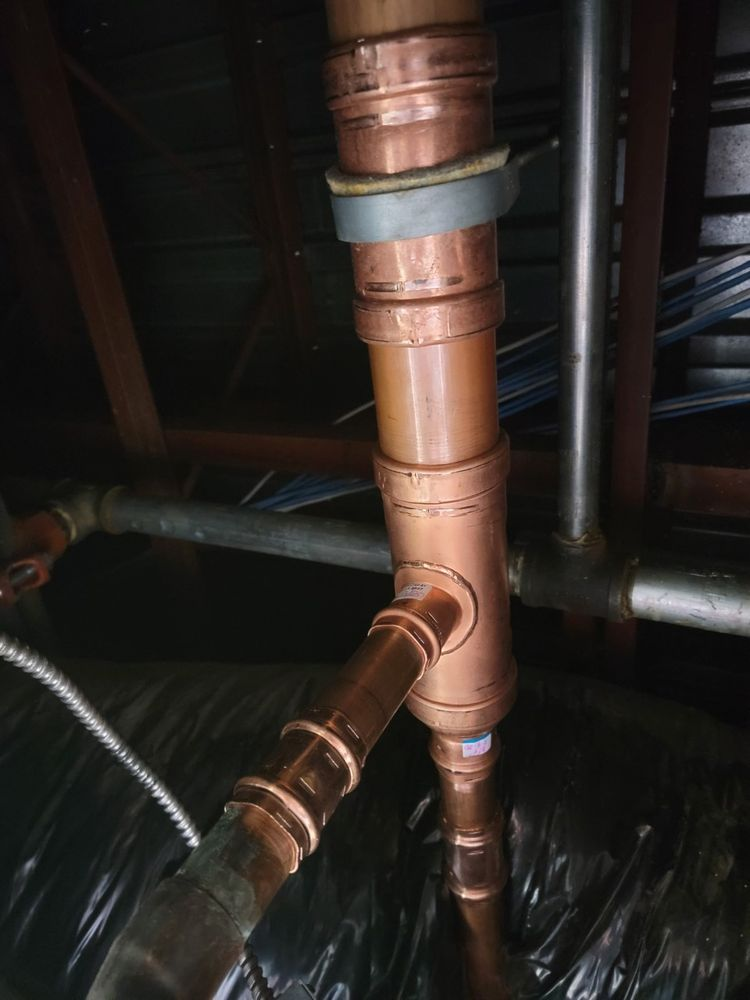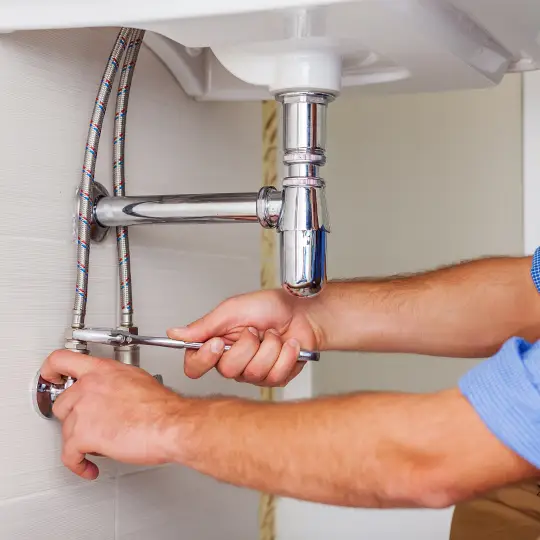We’ve all caught a whiff of something unpleasant and brushed it off. But when that smell resembles rotten eggs, it’s often a warning sign of something much more serious—a gas leak. Natural gas is highly flammable, and even a small leak can put your home and your family at serious risk. Gas leaks cause thousands of fires, explosions, and emergency calls every year in the U.S., with devastating consequences.
That’s why recognizing the signs early and knowing what steps to take can make all the difference. And when it comes to protecting your loved ones, you don’t want to take chances.
At Sweetwater Plumbing, we understand how urgent and dangerous gas leaks can be. That’s why we offer fast, reliable, and professional gas leak repair. Our team of certified experts is here to respond quickly and get the problem resolved before it turns into a disaster.
In this blog, we’re sharing everything you need to know about identifying gas leaks, protecting your home, and what to expect from a professional gas leak repair service. We’ll also touch on related plumbing concerns that can help you keep your entire system running safely and efficiently.
How Do Gas Leaks Happen?
Gas leaks usually occur when gas lines become damaged, corroded, or improperly installed. Here are a few common causes:
- Aging or deteriorating gas pipes
- Poorly fitted or damaged gas appliances
- DIY work on plumbing or appliances without proper knowledge
- External damage due to construction or landscaping
- Foundation shifting causing line stress or cracks
Gas lines, like any other part of your plumbing system, need regular maintenance and inspection to ensure everything is safe and secure.
The Warning Signs of a Gas Leak

Natural gas itself is odorless, but utility companies add a chemical called mercaptan to give it that sulfur-like rotten egg smell. If you notice that odor, don’t ignore it.
Other signs to look out for include:
- Hissing or whistling soundsnear gas lines or appliances
- Dead or discolored vegetationin areas where gas lines run underground
- Bubbles in water(if gas is leaking underground near a water line)
- Unexplained physical symptoms, such as dizziness, headaches, or nausea
- Higher-than-usual gas bills
If any of these sound familiar, it’s time to act fast.
What to Do If You Suspect a Gas Leak
Gas leaks are emergencies. If you think there might be a leak:
- Leave the area immediately. Don’t turn lights on or off, use your phone, or do anything that could ignite the gas.
- Avoid using electronicsuntil you’re far away from the suspected leak.
- Call 911 or your local utility companyto report the situation.
- Contact a professional plumberto handle the repair safely and effectively.
We never recommend trying to fix gas leaks yourself. It takes special tools, training, and certifications to do it right—and safely.
The Importance of Professional Gas Leak Repair
Gas leak repair isn’t just about fixing a broken line. It’s about keeping your entire home safe from potential fires, explosions, and health hazards. Here’s what a professional service should include:
- Thorough leak detectionusing specialized equipment
- Inspection of all gas lines and connected appliances
- Safe, compliant repair of damaged sections
- Testing for residual leaksafter the repair
- Preventative recommendationsto avoid future leaks
We use advanced techniques for accurate gas leak detection, including pressure testing and electronic sniffers, to make sure nothing goes unnoticed.
How Gas Leaks Affect Your Plumbing System

Believe it or not, a gas leak can point to other underlying plumbing issues. If your gas line is damaged, it might be a sign that your foundation has shifted or that nearby water lines are also at risk. That’s why it’s smart to have a complete inspection when you book gas leak repair.
While we’re checking the gas lines, we often recommend looking into things like:
- Slab leak detection: A shifting foundation can affect water and gas lines alike.
- Water heater repair: Gas-powered water heaters need regular inspection to avoid dangerous leaks.
- Drain cleaning: Gunked-up drains can put stress on your system and increase wear and tear.
- Sewer line repair: Corroded sewer lines might also indicate pipe damage elsewhere.
Catching small issues early can save you from major repairs later.
Why Gas-Powered Appliances Deserve Extra Attention
If your home has a gas water heater, stove, or dryer, make sure they’re all professionally installed and inspected regularly. Faulty connections or aging parts can easily become leak points.
For example, we often find leaks during routine hot water heater repair visits. A tiny leak near the water heater’s gas line can go unnoticed for weeks but still pose a serious risk.
Tankless models are another area to watch. Though they’re more efficient, they require expert installation and tuning. Any missteps can lead to gas leaks over time, especially in tight utility closets or enclosed spaces. If you’re noticing any irregularities with your system, scheduling tankless water heater repair right away is a smart move.
Safety Tips for Preventing Gas Leaks
We always say that prevention is better than emergency calls. To keep your home safe, follow these safety practices:
- Have your gas lines and appliances inspected once a year.
- Install carbon monoxide detectors on every floor.
- Schedule water heater inspections regularly.
- Never attempt DIY gas line work.
- Call a qualified plumber if you notice any signs of trouble.
And if you’re making home improvements, let the contractor know about your gas line layout to avoid accidental damage.
When Gas Leaks Require Immediate Help
Certain situations can’t wait. You should contact an emergency plumber if:
- You smell gas indoors
- You hear hissing near a gas appliance
- Your carbon monoxide detector goes off
- Someone in your home is feeling dizzy, nauseous, or faint without explanation
Don’t second guess. Fast action can prevent fires and keep your family safe.
The Connection Between Gas Leaks and Other Plumbing Issues

When we respond to gas leak calls, it’s not uncommon to uncover other problems. Plumbing systems are interconnected, and what affects one part often impacts another. Here are a few examples:
- Slab leakscan put pressure on gas lines beneath the home.
- Faulty sewer linesmight indicate deeper infrastructure issues.
- Blocked drainscan add wear and tear to your plumbing system.
- Water heaters, especially older or poorly installed ones, are common sources of leaks.
Scheduling routine maintenance or inspections can catch these issues early. If you’re already calling for gas leak repair, it might be a good time to ask about leak detection, water heater replacement, or drain inspections too.
What to Expect During Professional Gas Leak Repair
You might be wondering what the repair process looks like. Here’s a quick overview:
- Initial inspection and gas shut-off
- Leak detection using tools like gas detectors and pressure tests
- Identification of the source
- Repairs to damaged lines or fittings
- Re-testing for leaks
- Restoration of service and documentation
Depending on the severity, the repair can take a few hours to a full day. Our goal is always to ensure safety, compliance with regulations, and peace of mind for the homeowner.
Ready to Make Your Home Safer?
Think back to the last time you checked your gas lines or had a professional inspect your water heater. Can you remember? If it’s been a while, now might be the perfect time to schedule a checkup. Waiting for a leak to make itself known can lead to costly damage, dangerous exposure, and unnecessary stress.
At Sweetwater Plumbing, we’re committed to making homes safer and systems stronger. We don’t just handle gas leak repair—our licensed professionals can also help with tankless water heater installation, sewer line repair Pomona, water heater replacement, and leak detection. We’re the local plumber you can trust when emergencies strike or when you simply want peace of mind.
Whether it’s routine service or an emergency plumber Riverside you need, you can count on us for fast, courteous, and reliable help. Don’t wait for a serious problem to develop. Contact Sweetwater Plumbing by calling 909-312-4516 to schedule your inspection or repair service, and let us help you protect your home and the people in it.




